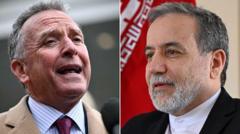Talks aim at facilitating Saudi Arabia's access to U.S. nuclear technology while addressing concerns over potential weaponization.
U.S. and Saudi Arabia Reignite Nuclear Technology Discussions

U.S. and Saudi Arabia Reignite Nuclear Technology Discussions
Energy Secretary indicates a viable avenue for Saudi Arabia to pursue nuclear energy development.
In a timely development, U.S. Energy Secretary Chris Wright announced that the United States has revived discussions with Saudi Arabia regarding the transfer of nuclear technology. This initiative seeks to support Saudi Arabia's pursuit of a commercial nuclear power industry, with possible provisions for uranium enrichment.
After meeting with Saudi officials in Riyadh, Wright expressed optimism about the negotiations, stating that a clear “pathway” exists for progressing towards a formal agreement. He emphasized the importance of establishing control over sensitive technology, hinting at solutions involving domestic enrichment capabilities.
While the U.S. has long faced challenges in finalizing a nuclear deal with the kingdom, largely due to concerns surrounding potential nuclear weapons development, this new momentum could signal a shift. The U.S. had previously stalled talks over Saudi Arabia’s reluctance to agree to non-proliferation measures.
A notable factor in these discussions is the potential linkage to Saudi Arabia normalizing relations with Israel. Wright noted that relationships are often multifaceted and that there are various avenues for U.S.-Saudi cooperation.
With the kingdom's focus shifting from oil dependency to a diversified energy portfolio, establishing a nuclear energy program has become a priority. However, key contentious issues remain concerning the extent of uranium enrichment rights and the overarching aim of preventing military capability concerns. The coming months are critical as both nations look to navigate these intricate negotiations.
After meeting with Saudi officials in Riyadh, Wright expressed optimism about the negotiations, stating that a clear “pathway” exists for progressing towards a formal agreement. He emphasized the importance of establishing control over sensitive technology, hinting at solutions involving domestic enrichment capabilities.
While the U.S. has long faced challenges in finalizing a nuclear deal with the kingdom, largely due to concerns surrounding potential nuclear weapons development, this new momentum could signal a shift. The U.S. had previously stalled talks over Saudi Arabia’s reluctance to agree to non-proliferation measures.
A notable factor in these discussions is the potential linkage to Saudi Arabia normalizing relations with Israel. Wright noted that relationships are often multifaceted and that there are various avenues for U.S.-Saudi cooperation.
With the kingdom's focus shifting from oil dependency to a diversified energy portfolio, establishing a nuclear energy program has become a priority. However, key contentious issues remain concerning the extent of uranium enrichment rights and the overarching aim of preventing military capability concerns. The coming months are critical as both nations look to navigate these intricate negotiations.





















